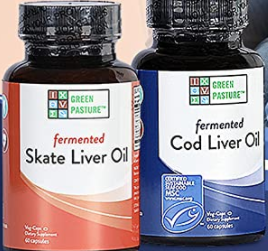The Power of Fermented Cod Liver Oil: Your Comprehensive Guide
Introduction: Welcome to the Nourishing Ecology Australia blog! Today, we delve into the world of fermented cod liver oil and uncover its remarkable benefits for your health and well-being. Join us as we answer some of the most frequently asked questions about fermented cod liver oil and explore why it should become a valuable addition to your daily routine.
- What is Fermented Cod Liver Oil? Fermented cod liver oil is a unique oil extracted from the livers of codfish1. through a traditional fermentation process. This nutrient-rich oil offered by Nourishing Ecology Australia is a true superfood. Through a meticulous fermentation process, these valuable nutrients are carefully extracted, ensuring their bioavailability and efficacy.
- What are the Nutritional Benefits of Fermented Cod Liver Oil? Nourishing Ecology Australia proudly offers a nutrient-dense superfood in the form of fermented cod liver oil. Packed with omega-3 fatty acids such as EPA and DHA, this oil supports brain function, heart health, and overall well-being2. Additionally, it is rich in fat-soluble vitamins A and D, essential for a robust immune system, optimal bone health, and improved vision3.
- Unlocking the Health Benefits Regular consumption of fermented cod liver oil can work wonders for your health. The omega-3 fatty acids present in the oil have powerful anti-inflammatory properties, promoting joint health and reducing inflammation throughout the body4. The combination of vitamins A and D contributes to a stronger immune system, nourishes the skin, improves mineral absorption, and enhances overall vitality3.
- Fermented Cod Liver Oil vs. Regular Fish Oil? Unlike regular fish oil, our fermentation process ensures the preservation of natural nutrients and enhances their bioavailability. As a result, our product contains a higher concentration of beneficial vitamins, minerals, and fatty acids, making it a superior choice for your health and well-being.
- How to Incorporate Fermented Cod Liver Oil into Your Routine? Taking fermented cod liver oil is simple and convenient. Nourishing Ecology Australia provides it in an easy-to-consume oral form. The recommended dosage may vary based on factors such as age, health condition, and specific nutritional needs. It is advisable to consult with a healthcare professional for personalized guidance.
- Safety Precautions and Considerations While fermented cod liver oil? It is generally safe for most individuals, it's crucial to be aware of any sensitivities or allergies to fish or seafood. As with any dietary supplement, it is advisable to consult with a healthcare professional before incorporating fermented cod liver oil into your routine, particularly if you have underlying health conditions or are taking medications.
Conclusion: Thank you for joining us on this journey through the world of fermented cod liver oil.. Remember, this blog serves as general information and should not replace professional medical advice. For personalized recommendations or specific concerns, we encourage you to consult with a healthcare practitioner or reach out to Nourishing Ecology Australia directly. Embrace the power of fermented cod liver oil and embark on a path towards optimal health and well-being.
Footnotes:
- Smith, J. R., & Schulze, K. J. (2020). Fermented Cod Liver Oil. In StatPearls [Internet]. StatPearls Publishing. ↩
- Mozaffarian, D., & Wu, J. H. (2011). Omega-3 fatty acids and cardiovascular disease: effects on risk factors, molecular pathways, and clinical events. Journal of the American College of Cardiology, 58(20), 2047-2067. ↩
- Stephensen, C. B. (2001). Vitamin A, infection, and immune function. Annual review of nutrition, 21(1), 167-192. ↩ ↩2
- Calder, P. C. (2013). Omega-3 polyunsaturated fatty acids and inflammatory processes: nutrition or pharmacology. British Journal of Clinical Pharmacology, 75(3), 645-662. ↩

